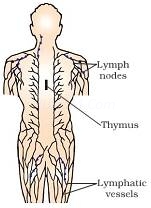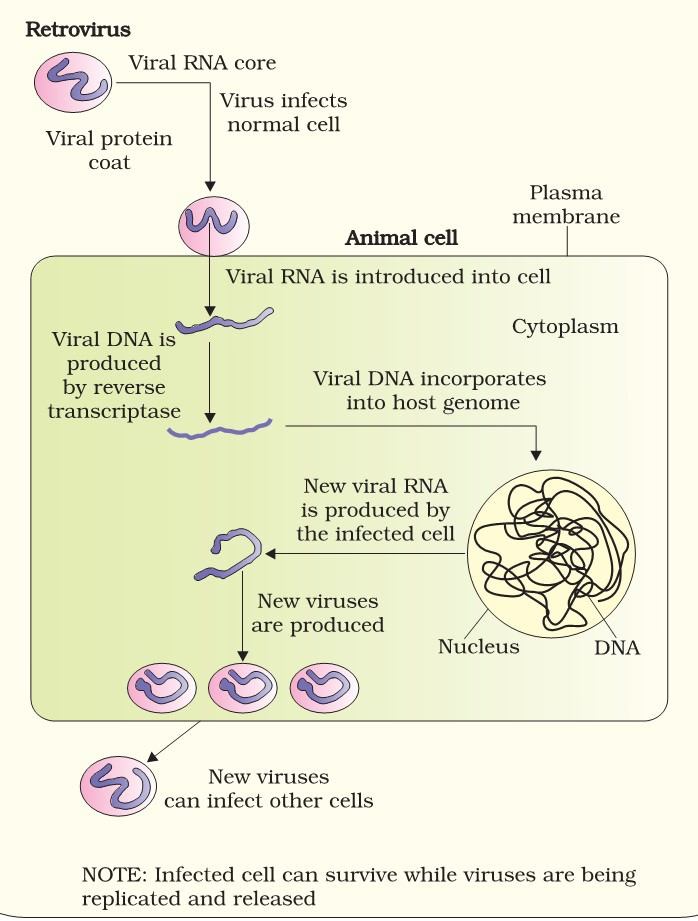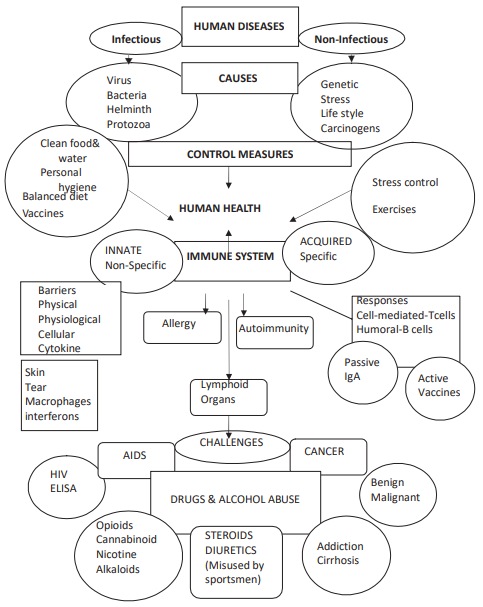Human Health and Disease CBSE Notes: Revision is the only key to getting good marks. Thinking that you will top the exam by just studying the day before won’t help. A student should at least have an understanding of what a chapter talks about before solving its questions. It sometimes becomes tedious for students to read the whole chapter again before the exams, and the same is true for teachers while helping students with their revision. There should be an alternative that explains the whole chapter in a short time and on very few pages.
Do not worry. We have worked on that part for you. Below are the short notes for CBSE Class 12 Biology from Chapter 7 Human Health and Diseases. You can go through these to help you prepare for your exams in the shortest amount of time. These CBSE notes are designed for quick and effective revision. To make these notes, only the revised NCERT Class 12 Biology textbook was used, and thus you may find a few definitions similar to those in the book. These notes can be used by students for their NEET examination, as Human Health and Diseases is a big portion of the syllabus. Check and download the CBSE Class 12 Human Health and Diseases revision notes.
CBSE Class 12 Biology Chapter 7 Human Health and Diseases Revision Notes
Introduction:
- The complete social, emotional, and psychological well-being of a person is called health.
- It is affected by genetics, infections, and lifestyle.
- Components of health: Mental, Physical, and Social.
Diseases:
- These are the abnormal conditions in the body that affect its normal functioning.
- The causative factors could be pathogens, genetic disorders, environmental factors, or lifestyle.
- A person who is healthy cannot be said to have a disease, and vice versa.
- A disease can be infectious (easily transmitted from one person to another) or non-infectious (cannot be transmitted from one person to another).
- Infectious diseases: Common cold, malaria, typhoid, pneumonia, ascariasis, filariasis, etc.
- Non-infectious diseases: Diabetes, cardiovascular diseases, mental health conditions, etc.
Immunity:
- It is the ability of the living body to defend itself against infections.
- Immunity is of two types: Innate Immunity and Acquired Immunity.
Innate Immunity:
- Non-specific type of defence.
- Present at the time of birth.
- Physical barriers, Physiological barriers, Cellular barriers, and Cytokine barriers fall under innate immunity.
Acquired Immunity:
- It is pathogen-specific.
- It is characterised by memory.
- Its components are T-lymphocytes, B-lymphocytes, and antibodies.
- It involves humoral immune responses and cell-mediated immunity.

Active and Passive Immunity:
- When antibodies are formed by the body itself during the time of a pathogen encounter. That is called active immunity. It shows a slow response.
- When ready-made antibodies are introduced into the body to fight against the foreign agent. That is called passive immunity. It is performed in the case of an emergency because the response is fast.
Vaccination and Immunisation:
- In vaccination, a preparation of antigenic proteins from a pathogen or an inactivated or weakened pathogen (vaccine) is introduced into the body. The antibodies produced in the body against these antigens would neutralise the pathogenic agents during an actual infection.
- Making a person immune by developing antibodies against specific antigens is called immunisation. That can be an active or passive immunisation.
Allergies:
- The exaggerated response of the immune system to certain antigens present in the environment is called allergy.
- The substances to which such an immune response is produced are called allergens.
Auto-Immunity:
- It is a condition that occurs when the body starts attacking its own cells.
- This could be due to genetic causes or any other unknown factor.
Lymphoid Organs:
- Primary Lymphoid Organs: Bone Marrow and Thymus. Here, immature lymphocytes differentiate into antigen-sensitive lymphocytes.
- Secondary Lymphoid Organs: Spleen, Lymph Nodes, Mucous Membrane Layers, and Tonsils. These provide the sites for the interaction of lymphocytes with the antigen, which then proliferate to become effector cells.

AIDS:
- Acquired Immuno Deficiency Syndrome.
- Causative agent: Human Immuno deficiency Virus (HIV), a member of a group of viruses called retroviruses.
- Attach defence cells like macrophages and lymphocytes.
- Break the body’s immune system.
- Spread through direct content like infected needles and unprotected sex with an infected person.
- Diagnostic test: ELISA (enzyme linked immuno-sorbent assay).

Cancer:
- Tumour: Mass of cells
- Benign tumours do not spread in the body.
- Malignant tumours spread in the body. Show metastasis.
- Cancer can be caused by carcinogens, oncogenes, various lifestyle factors, and environmental factors.
Drugs and Alcohol Abuse:
- The drugs that are commonly abused are opioids, cannabinoids, and coca alkaloids. The majority of these are obtained from flowering plants. Some are obtained from fungi.
- Opioids are drugs that bind to specific opioid receptors present in our central nervous system and gastrointestinal tract.
- Cannabinoids are a group of chemicals that interact with cannabinoid receptors, principally in the brain.
- Coca alkaloid, or cocaine, is obtained from the coca plant, Erythroxylum coca, native to South America. It interferes with the transport of the neurotransmitter dopamine.
- Withdrawal syndrome: symptoms appear when the drug is not consumed by the addicted person.
- Cirrhosis: Damage caused to the nervous system and liver.
Preventive Measures:
- Adequate nutrition, regular exercise, and a balanced lifestyle can promote good health.
- Hygiene practises, like handwashing, can prevent the spread of infectious diseases.
- Avoiding tobacco and excessive alcohol consumption can reduce the risk of various diseases.
| Important Terms |
| 1 PMNL-Polymorpho-Nuclear Leukocytes 2 CMI- Cell Mediated Immunity 3 ELISA- Enzyme Linked Immunosorbent Assay 4 MALT- Mucosal Associated Lymphoid Tissue 5 SCID-Severe Combined Immuno Deficiency 6 NACO-National AIDS Control Organisation 7 MRI-Magnetic Resonance Imaging 8 HLA-Human Leukocyte Antigen 9 Carcinogens-Cancer causing agents. e.g., gamma rays, UV rays, dyes and lead. 10 Immunity- Resistance to infection or antigen 11 Immuno Suppressant`-The chemical which suppress the immune response to antigen. 12 Interferon-The glycoproteins produced by our body cells in response to a viral infection 13 Incubation Period-The time period between infection and the appearance of symptoms. 14 Metastasis-The property in which the cancer cells spread to different sites through blood and develop secondary tumours. 15 Oncogene-Gene which causes cancer. 16 Retrovirus-A virus having RNA as genetic material and forms DNA by reverse transcription and then replicate e.g., Human Immunodeficiency Virus (HIV). 17 Syndrome-Group of symptoms. 18 Vaccination- Inoculation of a vaccine to stimulate production of antibodies and provide immunity for one or more diseases. |

Comments
All Comments (0)
Join the conversation